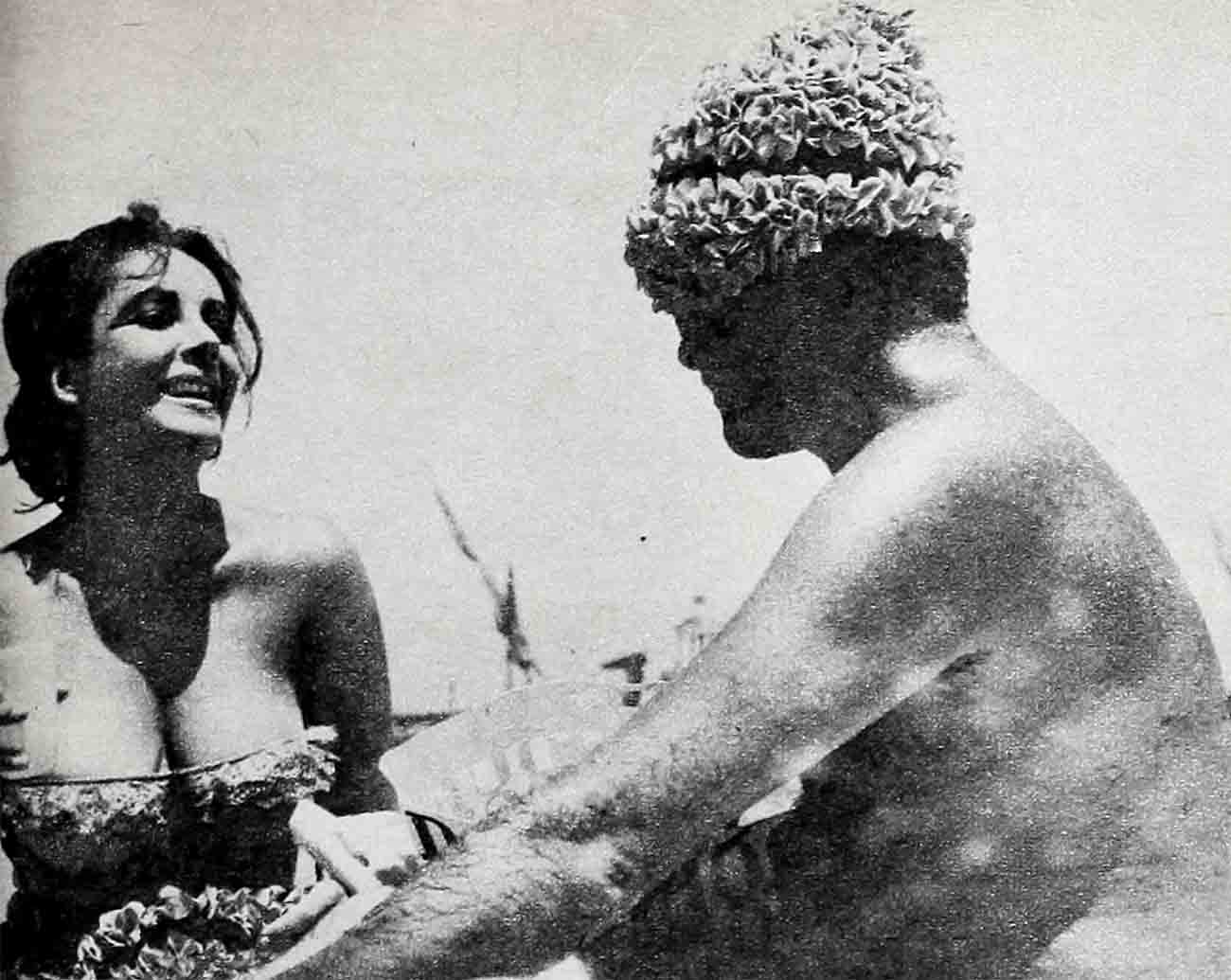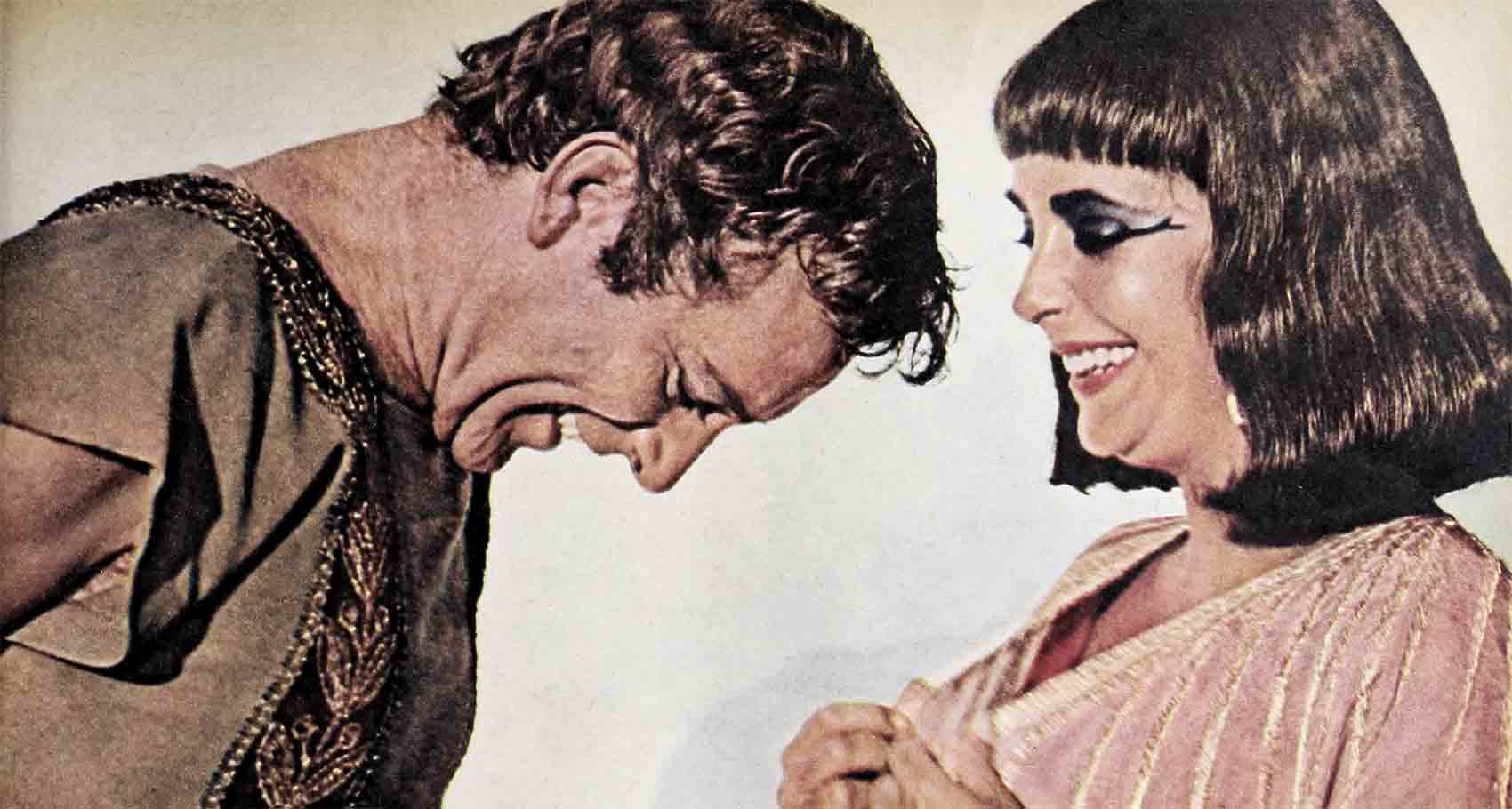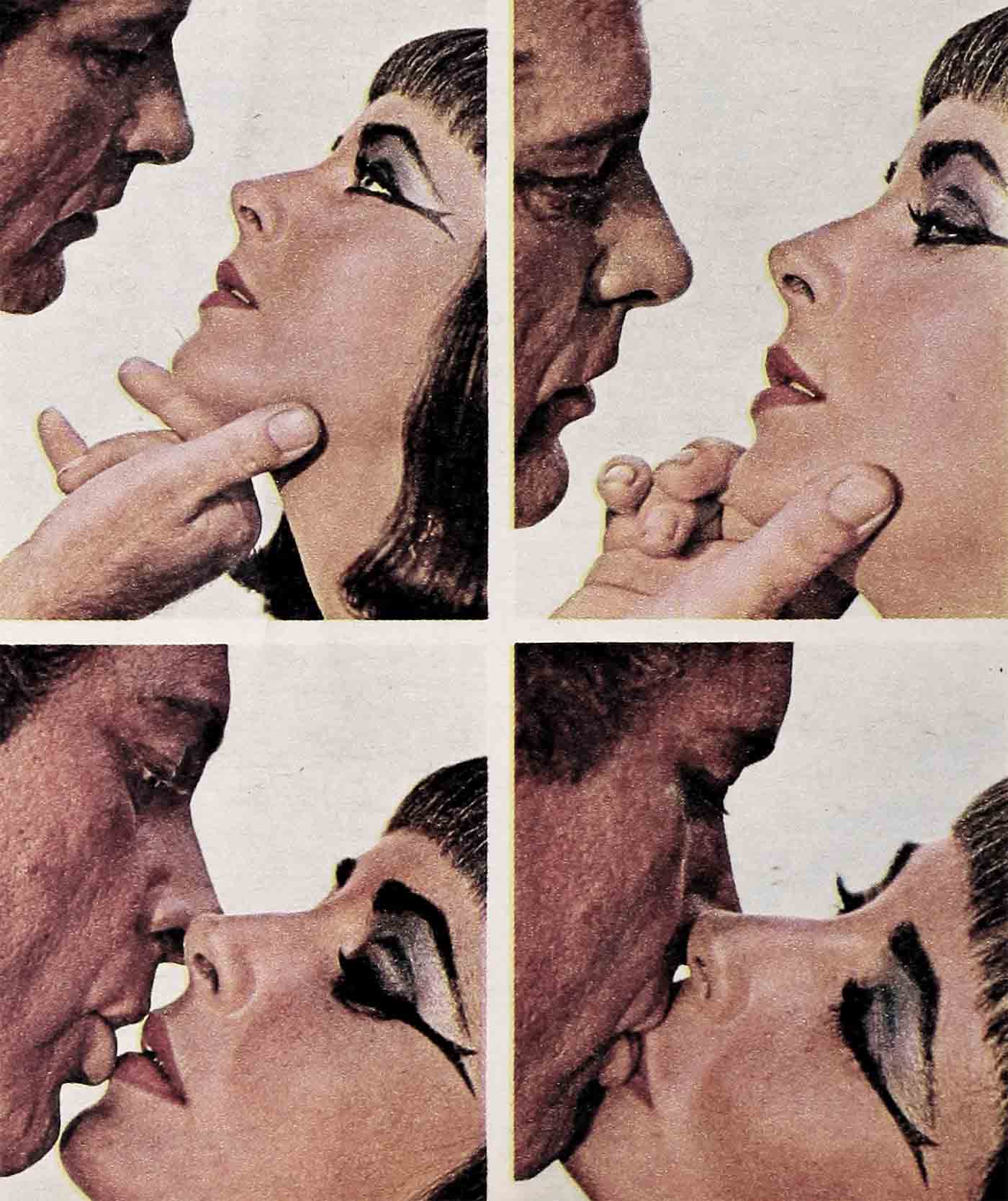
What Burton Does To Liz That No Other Man Would Dare!
Richard Burton, in a way, is a man who has everything . . . health . . . good looks . . . talent.
And, above all, he has Liz Taylor.
But, because life is a balance sheet of assets and debits, Richard has his problems, too.
And, again above all, his biggest problem is Liz.
It seems the lady has always had this peculiar habit of trying to turn her men, once captured, into her slaves. Think of her ex-husbands. . . .

Certainly, in one way or another, each of Liz Taylor’s four ex-husbands—to say nothing of her countless boyfriends—was more-or-less her slave. Nicky Hilton was a slave to the image of the fairytale princess come to life (until the not-so-fairytale fights began midway through their honeymoon). Mike Wilding was a slave to the flattery of this gorgeous creature. She pursued him to the ends of the earth—or to England, at least (and he married her, and lived happily with her . . . until Mike Todd came along). Mike Todd was a slave to the spirit of youth which she gave back to him (from the moment they met, until his death). Eddie Fisher was a slave to the unexpected grandeur which she brought to his up-till-then comparatively humdrum and superannuated Boy Scout life.

As Max Lerner, the distinguished social commentator, wrote recently of Liz: “She is a woman with much of the imperiousness of Catherine of Russia as she inspected her guardsmen, reserving the right not only to pick but to squeeze dry and throw away . . . one of those beautiful, historic, fateful ladies who draw men irresistibly toward them.”
As Richard Burton well knows today, he is the latest of these men who has been drawn to our modern-day Catherine, or Cleopatra, or what-have-you.
The difference, however, between Burton and the others is that he has vowed that nobody—but nobody—is going to squeeze him dry, or make him lose control. Not even la belle dame Liz.
She can enthrall him with her beauty—why not?
But with her wiles—never!

Because Burton knows that if he loses his maleness, he loses everything; that if Liz succeeds in emasculating him, making him her slave, if once—just once—he bends to lick her slippers, he will be just another name to be added to an already over-long list.
And to this he says: The hell I’ll be!
Yet for all his determination, he almost slipped, succumbed to Liz’ master plan to get him as a husband when the “London Sketch” printed his alleged quote on his wedding plans: “I want to marry Elizabeth Taylor and I will marry her. There have been all kinds of rumors but this is what is going to happen. No ifs. No huts. She wants to marry me. I want to marry her.”

The newspaper then quoted Liz as commenting. “I’m so happy that Richard has told you.” And. as if to guarantee the whole thing, Dick Hanley, Liz’ secretary, said the report was “fully correct.”
The press of the world got into action. They were hungry for confirmation, for more detail, for more quotes. A Photoplay reporter phoned Burton at the Dorchester in London and got the following exclusive conversation: “I did make that statement. I want to marry Elizabeth. I’m going to . . . She has everything I want in a woman. She is quite unlike anyone I’ve ever known. She makes me not want to know any other woman, believe me sincerely . . . Love? Like nothing I’ve ever known . . . I think of her morning, noon and night. I dream about her and I think she dreams about me, too. It will be my greatest happiness—forever, of course. . . .

“Divorces will come, they have to. I know Sybil will go through with it. Sybil and I are working it out. She has been given a handsome settlement.”
We mentioned the reported figure of $1,500,000.
Burton laughed and said, “Can’t say, you know more than I do. That sound like a generous offer to me. Maybe you reporters have the inside, ha ha.
“Liz can be more generous than I; she can afford to be . . . I don’t know if she is giving Fisher half. I know they have a business partnership—I think so on ‘Cleopatra.’
“I fell in love with her. On the set. At once. Seeing her was like seeing the true Cleopatra, a mirage, the beauty of the ages coming through up the Nile—and not even a barge built yet . . . We sort of drew to each other like a magnet. Irresistible. Like the pull of gravity. Zing.”


We asked about Liz’ four children.
“I will love the children like my own.”
We mentioned that we had seen Sybil.
“How is she? I will see my children as often as possible. I think Sybil likes it over on that side of the Atlantic. You know she has friends: it’s like a second home. I’m glad to hear she has a nice place. Central Park? I’ve heard, yes, I know, the very best school.
“How is Rex? I was honored to be in “Cleopatra’ with him . . . I think he is happy with Rachel. I know her well. Good girl. Lot of talent.”
We asked if he’d set October as the wedding date, as he’d been quoted.


“I don’t know if October. I will wait forever. So will she, she wants marriage more than anything.” He thought he’d like to be married in church! “I would like it, yes, feel more in bond, united.”
That was quite a statement; it would make quite a scoop. Yet the very next day, a couple of confusing things happened:
David Lewin of “The London Daily Mail” met Sybil in Manhattan and told her of Richard’s reported plan to marry Liz as soon as they were both free. Sybil said, “It seems that I am the person least concerned . . . Richard hasn’t told me, and he hasn’t telephoned me from London. Divorced? I don’t know. It is too early yet to say . . . I know nothing of cash settlements or decisions . . . I know and understand him so well. I react to his moods. You see, it is not only that I loved Rich. I like him, too. And liking is more important in marriage than love.”

And most confusing of all, Burton himself denied the whole thing, saying he was misquoted, saying it was “Just a joke.” He did admit telling a “Sketch” reporter that he and Liz were going to get married. “But,” he added, “yesterday I added, ‘But not to each other.’ ”
Liz was not available for comment.
This “joke” of Burton’s was the ultimate in humiliation. In humiliation to Liz, and in utter disrespect to the sacred state of matrimony. It is the woman’s prerogative to make the announcement of a wedding, if there is to be one. Although Burton has cast aside most rules of accepted conduct, it just is not cricket for a man who is living in open adultery to go a step further and announce the legitimatizing of his union, and then make a complete mockery of the whole institution of marriage by retracting it as simply a “joke.”

“This time he’s gone too far,” said a friend who, until now, has stood by him through all his escapades.
“He was probably drunk. The whole thing reminds me of that announcement Glenn Ford made about Linda Christian,” snorted another.
“Utterly without taste,” declared a third.
Burton is doing things to Liz, treating her in a way that no other man has ever dared. And still Liz puts up with him, even with this last greatest insult, because he is more of a man than she has ever known.
Walter Wanger, the producer of “Cleopatra,” recently observed about Burton:
“He is the epitome of the European male, sophisticated, self-assured and forceful in his opinions. He does not hesitate to put women in their place.”
Liz, naturally, is the woman for place-putting now. Before this she was a love goddess-movie queen who gave with the orders, the demands, the ultimatums—she is now more like Shirley Temple in the process of making her first movie . . . with Burton as the director. Shouting out some orders of his own.
He reportedly informs Liz—and in no uncertain terms—that he is the center of their relationship, not she. He reportedly makes it clear that while, at the moment, she may be first among women—she is only a woman. And women are subordinate to men. As she must be to him. And he also reportedly lets her know, often, without mincing words, that he is not going to cater to her. More than that, he again reportedly keeps her guessing about his future love life, talking often about his past conquests and intimating that a true romantic never stops shopping around—and so why should he be expected to.

“In short,” says someone who should know, “Richard’s strategy is to keep Liz nervous and guessing, and to give her no time to plot any strategy of her own. And thus does he alternate between that weird mixture of indifference and ecstasy. Ecstasy because he is truly in love with the woman. Indifference because he knows that this is the only way to keep that love in tow—on his terms.”
It is interesting to note here that at the beginning of their relationship Liz obviously thought that Burton would, like the others before him, capitulate to her wishes and what might be termed Taylor-made Standards of Romantic Conduct.
In Rome, for instance, hadn’t Burton—by nature supposedly rather tight with the buck, the pound, the lira—bought her a brooch, a fifty-carat emerald set with diamonds and sapphires, that set him back exactly $129,000 . . . 46,000 pounds . . . 80 million lire? (That “set-back,” as reported by someone who was there, is why Burton exploded, “My God, that’s a fortune!” To which Liz said, quietly, “I like it.” To which Burton, after a very perceptible pause, whispered, “All right, we’ll take it.”)
And, again in Rome, when a pretty blonde young thing from New York with whom Burton was reportedly having a “romance” at the time was constantly showing up on the “Cleopatra” set—at Burton’s invitation—(as if to keep both Liz and Sybil hopping), hadn’t Liz managed to see to it that she was first, if we are to believe the well-documented story, “exiled” from the set, and then “exiled” from Rome and Richard’s life?

Yes, at the beginning then, it looked indeed as if the pattern was to be the same—Liz gayly humming her siren’s song, her lover dancing to the tune.
Except that, as any musicologist will tell you, along with the Italians there are no other people on earth who know as much about music as the Welsh. And Richard Burton is a Welshman.
It didn’t take him long to realize that something was definitely off-key here . . . something was offensive to his ears . . . offensive to his sensibilities. Why, he was dancing to a Sonata for a Jerk!
The Sonata obviously needed vast revisions. So he took over. Suddenly. He began to call the tune.
And, her feet reaching down nervously from her long-occupied pedestal, touched earth finally—and things did change.
Absolute master of the situation now, Burton began to do all the things that were previously verboten to other men. Instead of dropping his wife for Liz immediately, for instance—as Eddie Fisher had dropped Debbie Reynolds back in those dark days of late-1958—Burton actually continued seeing Sybil and, to boot, showing public affection for her and, to double boot, stating over and over again that he did not think he would ever leave his wife for any other woman.
Instead of sweeping Liz off her feet—as Mike Todd had done, when he’d told her one day. “Listen. Honey, from now on you don’t have anything to do with anybody but me!”—Burton had actually made it quite clear to Liz that, despite their grand passion, he wouldn’t mind it a bit if she went out with another fellow or two from time to time.

Later, when the grand passion became grander—and Sybil had gone from Richard’s life, and Eddie from Liz’—and it was only the two of them now facing the world alone, Liz more and more needed security from her man. . . . And Burton, her man. seemed to get his pleasure in confusing her.
A superb actor trained in the classical tradition, one of the four men in theatrical history who has played Hamlet for more than one hundred consecutive performances Burton—instead of being agog over the fact that his girlfriend was the most celebrated and highest-paid film star in the world—would make it rather clear, observers say, that he considered Liz to be just one of those Hollywood actresses. He considered her better than average, mind you, but, still, a gal who had quite a bit to learn. (As Walter Wanger said: “When Burton talks about the theater and art, Liz—despite her Oscar—is the student.”)
And as if to compound this artistic come-down on Liz’ part. Burton next began to commit that horror of horrors—to insult Liz—in public!
There was a time, those in the know will tell you, when one never mentioned the subject of “overweight” in front of Liz. That she had a tendency towards plumpness, that she adored rich foods, that candid and unretouched photographs of her often showed her standing on awkwardly large legs and practically waistless—this was all true, but it was a strictly forbidden subject to mention. So touchy, in fact, was Liz on the subject that she once sued a London newspaper which dared to suggest that her weight had had something to do with the original production delays on “Cleopatra.”

And then along comes Richard Burton.
And what does he nickname Liz?
“Fatty”—according to a leading columnist.
And how does Liz react?
She “smiles.” and seems to consider it a term of “endearment.”
But a smile in front of a newspaperman doesn’t necessarily linger once the newspaperman is gone from the premises. And indications are heavy these days that all is not a happy-time for Burton and Liz when they are alone together.
In their present predicament, of course, no one would expect them to stand around grinning at one another like idiots all day. The emotional pressures of the last year have been great, on both of them. Burton has given up much that was dear and important to him. Liz, reports have it, has had more than one quarrel with her father who, obviously, has not approved of the current goings-on.
To quote Max Lerner once more: “If you have given up everything and everyone else, shut out the rest of the world for the sake of one encompassing relationship, you come to demand from it what no human connection can deliver. Along with the vows and ecstasy, there are storms and furies, letters returned, charges of cruelty, volcanic outbursts of temper, reassurances, guilt, contrition, and ecstasies of passion to start the cycle all over again.”
In other words, while Liz and Burton love quite a bit—they also right quite a bit.
And the extent of their fighting can be gauged from this communique Photoplay received at press-time from one of our European correspondents:
“The sedate Dorchester hotel—where I am staying—was quite unhappy recently with their two famous guests, Richard and Liz. Guests phoned and complained about the noisy, ungodly battles that were raging in Liz’ and Burton’s adjoining suites into the late hours of the night.
“The verbal gist of one battle seems to have been something like this:
“Liz—‘You big boob—all you want to do is read Shakespeare when you’re around me. Well, I’ve had it. You and Shakespeare! Go back to Sybil—she’s literary enough to stand for that jazz. But I’m not!’
“Burton—‘Oh, shut your blasted mouth before I jam my foot down it. I jolly well can do it, you know!’
“At any rate, during one of their arguments Liz hurled several expensive lamps that were around the room in her suite at Burton. No one seems to know if Liz was on target or not, but one thing is certain. The suite was left a mess.
“One of the hotel employees told me: ‘She almost put one of the lamps through the wall. My presence had a salutory effect on quieting Miss Taylor down, but it was only temporary. I knew that we could expect them to fuss up again—and I wasn’t wrong. The very next night there was another donnybrook. but it was of a much shorter duration, and I dare say of far less destructive extent.’ ”
Who paid the tab?
Continues our correspondent: “I found out that management sent a $250 tab up to Liz for the damages. Reportedly, she called downstairs in a rage and protested the charge. ‘It wasn’t my fault,’ she complained. ‘Someone else broke things up here too, let me tell you!’ Those may not be precisely the quotes, but that’s the best my informant can do.”
The best we can do. meanwhile, is to wait and see what happens next.
There are those who think that Burton will finally succumb to Liz and become another number on her list, another of her out-and-out slaves. After all. they reason, even slavery may be better than dodging lamps and other heavy objects.
Others insist, however, that Burton will never give up his masculinity—that, if anything, he will give up Liz first.
Liz herself, of course, has no public comment on the subject. And certainly not on the cruel joke played on her.
And as for Burton’s reaction to all this—it is perhaps best summed up in a short interview he had the other day with David Lewin of the London Daily Mail.
“In ten years time,” asked Lewin, “how would you like to see yourself, Richard?”
To which Burton replied:
“Sane!”
—ED DE BLASIO
Liz and Burton are together now in 20th’s “Cleopatra,” and M-G-M’s “The V.I.P.s.”
It is a quote. PHOTOPLAY MAGAZINE SEPTEMBER 1963




